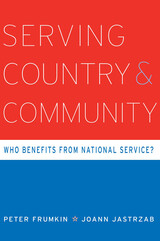5 start with S start with S

The United States has a long history of citizens rendering service to their communities. Examples of government-sponsored voluntary service organizations include the Civilian Conservation Corps, the Peace Corps, and Volunteers in Service to America (VISTA). During the Clinton administration, the national service movement was advanced by the establishment of AmeriCorps, a large-scale national service program designed to place young people in community service positions across the country. More recently, the Obama administration has set in motion a major program expansion of AmeriCorps over the coming decade.
Many decades, billions of dollars, and hundreds of thousands of volunteers after the creation of the first national service programs, it remains unclear who benefits from service, under what conditions these programs work best, and how exactly these service efforts contribute to the strengthening of communities. Serving Country and Community answers each of these questions through an in-depth study of how service shapes the lives of young people and a careful analysis of the strengths and weaknesses of these programs. Based on years of field work and data collection, Serving Country and Community provides an in-depth examination of the aims and effects of national service and, in the process, opens up a conversation about what works and what needs reform in national service today.

Never before have Americans been so anxious about the future of their society. But rarely has anyone offered a clear statement about why, in a nation so prosperous, free, and stable, we tend to assume that the country is in dire straits and that the government can do little to help. This book is just such a statement, an eloquent assessment of where America stands, how our society has changed in the past half-century, and who or what is responsible for our current frustrations.
Derek Bok examines the nation's progress in five areas that Americans generally consider to be of paramount importance: economic prosperity, quality of life, opportunity, personal security, and societal values. He shows that although we are better off today in most areas than we were in 1960, we have performed poorly overall compared with other leading industrial nations. And when it comes to providing adequate health care at a reasonable cost, educating our young people for high-skilled jobs, alleviating poverty and urban blight, and reducing crime, our record has been dismal. Comparing the United States with other leading industrial nations on more than sixty key indicators, Bok shows that we rank below average in more than two-thirds of the cases and at the bottom in more than half.
What has caused this decline, and what can be done about it? In virtually all important areas of American life, Bok concludes, government policies have played a significant, often decisive role in accounting for our successes as well as our failures. But whereas others call for downsizing the federal government, Bok argues that government is essential to achieving America's goals. In short, Ronald Reagan was only half right. Government is the problem. But it is also the most important part of the solution. By assessing the state of the nation and identifying the reasons for its current condition, this book helps set the agenda for improving America's performance in the future.

What led to the breakdown of the Soviet Union? Steven Solnick argues, contrary to most current literature, that the Soviet system did not fall victim to stalemate at the top or to a revolution from below, but rather to opportunism from within. In three case studies--on the Communist Youth League, the system of job assignments for university graduates, and military conscription--Solnick makes use of rich archival sources and interviews to tell the story from a new perspective, and to employ and test Western theories of the firm in the Soviet environment. He finds that even before Gorbachev, mechanisms for controlling bureaucrats in Soviet organizations were weak, allowing these individuals great latitude in their actions. Once reforms began, they translated this latitude into open insubordination by seizing the very organizational assets they were supposed to be managing. Thus, the Soviet system, Solnick argues, suffered the organizational equivalent of a colossal bank run. When the servants of the state stopped obeying orders from above, the state's fate was sealed.
By incorporating economic theories of institutions into a political theory of Soviet breakdown and collapse, Stealing the State offers a powerful and dynamic account of the most important international political event of the later twentieth century.

Examining public service from the perspective of the worker, this book provides a new framework for understanding the roles and responsibilities of front-line public servants and assessing the appropriateness of their actions.
Public employees who work at street level face some of the most intractable, pervasive, and complex problems in contemporary society. Drawing on more than 1500 hours of observation of police officers and social service workers in four states, this book explores the types of situations they confront, the factors they consider, and the hard choices they make. Presenting numerous cases of how these individuals acted in various situations, the authors show how public servants translate the expectations of administrators and others into legitimate street-level action.
Vinzant and Crothers propose the concept of leadership as a positive and realistic framework for understanding what these public servants do and how they can successfully meet the daily challenges of their very difficult and complex jobs. They show how changing the theory and language we use to describe street-level work can encourage decisions that are responsive both to the needs of the clients being served and to the broader community's need for accountability. They also examine how street-level leadership can change the way agencies recruit, train, and manage these employees and how society defines their role in governance.
This book offers valuable insights for those working in or studying public administration, policy analysis, criminal justice, and social work.

In this well-informed yet anxious age, public administrators have constructed vast cisterns that collect and interpret a meteoric shower of facts. Akhlaque Haque demonstrates that this pervasive use and increasing dependence on information technology (IT) enables sophisticated and well-intentioned public services that nevertheless risk deforming public policy decision-making and sees a contradiction inherent in a public that seeks services that require a level of data collection that in turn triggers fears of a tyrannical police state.
The author posits that IT’s potential as a tool for human development depends on how civil servants and citizens actively engage in identifying desired outcomes, map IT solutions to those outcomes, and routinize the applications of those solutions. This leads to his call for the development of entrepreneurs who generate innovative solutions to critical human needs and problems. In his powerful summary, he recaps possible answers to the question: What is the best way a public institution can apply technology to improving the human condition?
Engrossing, challenging, and timely, Surveillance, Transparency, and Democracy is essential reading for both policy makers as well as the great majority of readers and citizens engaged in contemporary arguments about the role of government, public health and security, individual privacy, data collection, and surveillance.
READERS
Browse our collection.
PUBLISHERS
See BiblioVault's publisher services.
STUDENT SERVICES
Files for college accessibility offices.
UChicago Accessibility Resources
home | accessibility | search | about | contact us
BiblioVault ® 2001 - 2024
The University of Chicago Press









